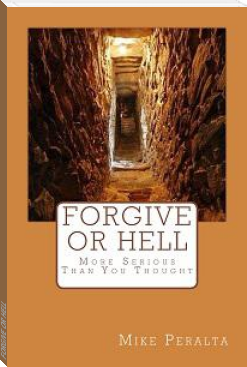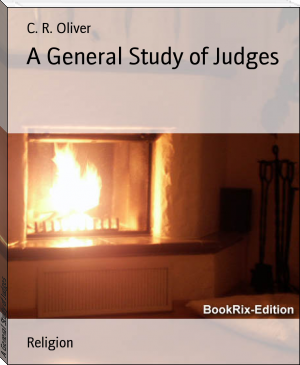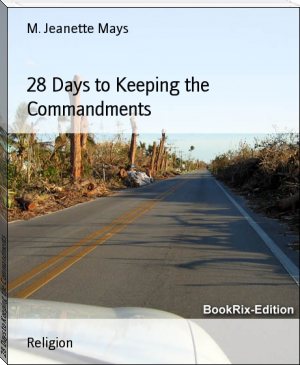TITHE OR HELL YOUR CHOICE - Mike Peralta (first ebook reader txt) 📗

- Author: Mike Peralta
Book online «TITHE OR HELL YOUR CHOICE - Mike Peralta (first ebook reader txt) 📗». Author Mike Peralta
Introduction
Chapter 1: Tithing Is Still Biblical
Chapter 2: Ceremonial Laws
Chapter 3: Moral Laws (Ten Commandments)
Chapter 4: Not Under Law But Under Grace
Chapter 5: Malachi Chapter 3
Chapter 6: Tithing Testimonies
Chapter 7: The Tithe In The New Testament
Chapter 8: All Thieves & Robbers Go To Hell
Chapter 9: The Fear of The Lord
Chapter 10: Hell Testimony by Choo Thomas
Chapter 11: Revelations of Heaven and Hell by 7 Columbian Youths
Chapter 12: Hell Testimony by Ricardo Cid
Chapter 13: Gate of Hell by Queen E. Dixon
Chapter 14: Hell Testimony by Angelica Zambrano
Chapter 15: Hell Testimony by Emmanuel Agyarko
Chapter 16: Is Eternity In Hell Worth Not Tithing?
INTRODUCTIONJudges 17:5-6 (KJV): And the man Micah had an house of gods [idols], and made an ephod, and teraphim, and consecrated one of his sons, who became his priest. in those days there was no king in Israel, but every man did that which was right in his own eyes.
It is amazing how history repeats itself. As Ecclesiastes 1:9 says “There is nothing new under the sun.” As anyone can see, most or at least many people – even those who call themselves “Christians” – are rejecting God’s commandments and substituting their own. Just like the days of Judges 17:5-6 many people are doing what is right in their own eyes. Not God’s eyes but their own eyes.
This is happening by accepting certain laws – such as “Do not murder” and “Do not steal” but rejecting others – such as not obeying the tithe law and not obeying the sabbath law. And so we see here the truth of the statement that “every man is doing that which is right in his own eyes.’
This is an extremely dangerous thing to do. And I’m not saying physically dangerous – but spiritually dangerous. Remember what Jesus tells us in Matthew 7:21-23, “Not everyone who says to Me, ‘Lord, Lord,’ will enter the kingdom of heaven, but he who does the will of My Father who is in heaven will enter. “Many will say to Me on that day, ‘Lord, Lord, did we not prophesy in Your name, and in Your name cast out demons, and in Your name perform many miracles?’ “And then I will declare to them, ‘I never knew you; DEPART FROM ME, YOU WHO PRACTICE LAWLESSNESS.’
Because of it’s extreme importance, as well as learning about the tithe, we will be studying this last verse (Mat 7:21-23) throughout this book. For now we will notice four things from this last verse:
• Only those who do the will of the Father (those that are obedient to the Father) will go to heaven.
• If you don’t have a close intimate relationship with Jesus then Jesus will end up telling you that He doesn’t know you and to depart from Him.
• Jesus will tell those who practice lawlessness (those who are disobedient and break God’s laws) to depart from Him. This is why obeying God’s laws in all of the Bible is necessary to enter into the Kingdom of Heaven. As it says in Hebrews 12:14, “Without holiness no one will see the Lord.”
• Even if you are involved in a good deal of ministry, even performing miracles – but don’t get close to Jesus and therefore do not do the Father’s will you will be cast into Hell.
Chapter 1: Tithing Is Still Biblical
Before launching into my teaching I wish to share the following:
“Not many of you should become teachers, my fellow believers, because you know that we who teach will be judged more strictly.” (James 3:1)
This scripture puts dread and fear in me. Why? Because I am going to be held accountable in what I teach you to a much greater measure. So you must understand, I am teaching these things because I see so much disobedience in the church and I know that many will land in Hell for this disobedience. My motivation is to give you the warnings in this book so that you can obey God and avoid going to Hell. This book is not about winning an argument against others who erroneously (rebelliously) teach and / or believe we don’t have to tithe anymore. It is for you, my reader, so that you can avoid Hell and be greatly blessed by heartfelt and willing obedience to Jesus Christ our Lord and Savior.
The aim of this book and teaching is to carefully study what God wants us to obey in regards to tithing. But some of the areas covered will also have relevance to other aspects of the law – such as the Sabbath Day (Commandment 4 of the 10 Commandments). The consequence of getting this right or wrong is not trivial. That is why I greatly urge you to sincerely pray to God that He reveal to you what His will is in this matter. Also treat this subject with the utmost respect and care as it will have eternal consequences on your eternal soul.
Ceremonial Laws
As well as treating the Sabbath and Tithe commandment, we will also look at ceremonial (or symbolic) laws (listed below) and how we are now expected to practice them in the New Covenant:
1. Blood Sacrifices,
2. Circumcision,
3. Food and Drink laws – unclean food regulations etc.
4. The Special sabbath (festival) days mentioned in the Old Testament (Notice that this is different from the regular day of rest Sabbath Day mentioned as the fourth of the ten commandments),
We will take great care to learn this – not from what men might reason – but by what the New Testament actually tells us.
Before going on (and so as not to worry you) the above 4 laws regarding Blood Sacifices, Circumcision, Special sabbath days, and Food and Drink laws are now to be practiced symbolically and spiritually and not physically as they were practiced in the Old Testament. This will be shown through New Testament teaching.
It is important to keep in mind that Jesus told us that: “I did not come to abolish the law or the prophets.” (Matthew 5:17) And this includes the above mentioned ceremonial laws such as circumcision etc.
In the Old Testament, the believers were supposed to obey these ceremonial laws physically, but now we are supposed to obey these laws in the spiritual sense – in the specific way that the New Testament commands. And they also make up what Christ did for us on the cross - namely the blood sacrifices in the Old Testament were representative of the ultimate sacrifice that Christ did for us by the shedding of His blood to establish the New Covenant. Notice that in this way, Jesus did not “abolish the law” even the blood sacrifice but fulfilled it for us perfectly, once and for all – as the New Testament tells us. Now this does not mean that the blood sacrifice was “done away with” or abolished. The blood sacrifice of animals was stopped physically and it was replaced by the blood sacrifice of Jesus. It is now practiced through Jesus – the perfect Lamb of God, by receiving Jesus as Lord and Savior.
Blood Sacrifices
It is very important to realize that “without the shedding of blood there is no forgiveness of sins.” (Hebrews 9:22) So to be saved the unbeliever must now receive the blood sacrifice that Jesus did in order for him to get saved (by receiving Jesus as his Lord and Savior). So we see in just this one law the eternal consequences of disregarding these ceremonial laws – that many take as trivial and just throw away as if they were trash.
This is why I stated earlier, that we must learn about all these laws very carefully and learn how to practice them in the way that God desires. As you can see from the blood example, these ceremonial laws have a great meaning and as I will show later – represent what is given to us in our salvation by grace through faith. In fact all four of the ceremonial laws previously mentioned have a connection and give meaning to the grace we now receive and have in Christ.
The sacrificial system with its holy feast days, new moon festivals and yearly Sabbath days such as Passover described in Colossians 2:14-16 pointed forward to the work of Jesus on the cross. They looked forward in faith to the atoning death of Jesus. As Colossians 2:17 itself says “These [ceremonial laws mentioned in Col 2:16] are a shadow of the things that were to come; the reality, however, is found in Christ.”
Moral Laws a.k.a. Non-Ceremonial Laws
In addition to covering the ceremonial laws I will also cover what is classified as the non-ceremonial laws - such as the Ten Commandments “Do Not Steal”, “Do Not Murder”, etc. and laws such as the Tithe. These are usually called “Moral Laws” or “Ethical Laws.” They can have symbolic meaning in addition to having practical physical application – but they are the type of laws that God commands that we still physically obey.
I realize everyone understands and accepts that we are still to obey the moral laws such as “Do Not Steal”, and “Do Not Murder”, etc. Those sins are way too obvious for satan to deceive people into thinking “they have been done away with.” Where people are deceived is in thinking that some of the other non-ceremonial laws such as the seventh-day Sabbath (commandment 4 of the Ten Commandments) and the Tithe commandment of Malachi 3:8 “have been done away with.” I will show through New Testament scripture and example that these commandments have not “been done away with.”
Not Under Law But Under Grace
After studying some on Ceremonial Law and Moral Law (NonCeremonial Law) we will then cover Paul’s statement in Romans 6:14 that “you are not under law, but under grace.”
I first include the teachings about Ceremonial law and Moral law so that we can properly understand Paul’s statements in Romans and elsewhere.
Why do I do this? I do this so that people realize – through Scripture – that we should not throw out any of God’s laws carelessly or haphazardly without studying what God really says about those laws.
But people, many times due to convenience and rebellion, throw out commandments to justify their disobedience. But they are only fooling and destroying themselves. As Peter says in 2 Peter 3:15-16 “His [Paul’s] letters contain some things that are hard to understand, which ignorant and unstable people distort, as they





Comments (0)